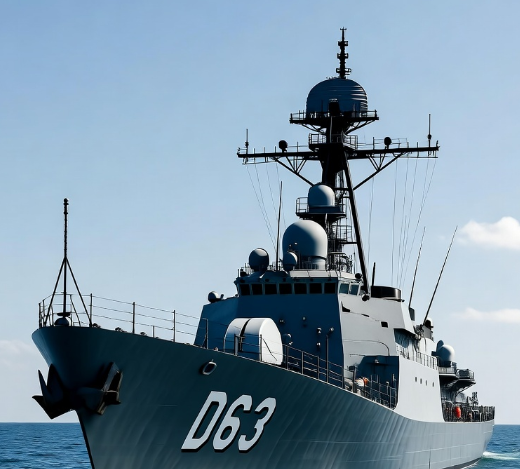
In a powerful display of its growing global military influence, India has taken a decisive step that has shaken Turkey’s strategic confidence. For years, Turkey, alongside Pakistan, has criticized India on international platforms—believing that New Delhi would respond only through diplomacy and not with tangible action. However, the recent developments in the Mediterranean have turned that perception upside down.
India has for the first time entered Turkey’s backyard by deploying its naval warships near the coast of Cyprus. This move, though subtle in execution, has massive geopolitical implications. It has sent shockwaves through Ankara’s establishment and even compelled a NATO member like Turkey to rethink its regional posture.
India’s Strategic Entry into Cyprus Waters
The turning point came when India sent its warships to the eastern Mediterranean for joint naval drills, known as a “passing exercise,” with the Cypriot Navy. This was not just a routine engagement—it was a symbolic and strategic message to Turkey that India’s reach is no longer confined to the Indian Ocean. India is now willing to display its military presence as far as the Mediterranean, bridging Asia, the Middle East, and Europe.
This move rattled Turkey, which has maintained a military presence in northern Cyprus since 1974 after its invasion of the island. Nearly half of Cyprus remains under Turkish occupation to this day, while the other half is a recognized member of the European Union. For decades, the West has done little beyond issuing statements, leaving Cyprus diplomatically isolated.
But India’s move changed the equation. Soon after Indian warships appeared in Cypriot waters, Turkey deployed over 100,000 soldiers in northern Cyprus—a clear sign of panic and overreaction. Ankara, which often presents itself as a strong NATO member, suddenly found its dominance challenged in a region it long considered unassailable.
The Modi Visit and the Strategic Partnership
The foundation for this assertive policy was laid earlier when Prime Minister Narendra Modi visited Cyprus. During his visit, both nations announced a Comprehensive Partnership that included defense cooperation, maritime security, and arms supply. The agreement was aimed at enhancing mutual defense capabilities and promoting joint security interests across the Indo-Mediterranean corridor.
This partnership deeply irritated Turkey, which has been one of Pakistan’s strongest backers. President Recep Tayyip Erdoğan has repeatedly raised the Kashmir issue at international forums, including the United Nations. India, instead of responding with rhetoric, chose a far more effective route—strategic counteraction.
India’s Expanding Defense Footprint
India’s defense exports have surged in recent years. From supplying arms to Southeast Asian countries and African partners, India has now started entering European defense markets. The potential for supplying Cyprus with drones, radar systems, and missile guidance technologies could significantly boost Nicosia’s defense capability while providing India an entry point into the European defense market.
Turkey fears that Indian technology and support could embolden Cyprus militarily, undermining Ankara’s decades-long control in the region. For India, this isn’t just about helping an ally—it’s about demonstrating that it can operate, influence, and secure its interests far beyond South Asia.
The Significance of Cyprus for India
Cyprus holds immense geopolitical importance. Situated at the crossroads of Europe, the Middle East, and North Africa, it serves as a strategic bridge between three continents. While Western powers have largely ignored the ongoing occupation issue, India’s engagement with Cyprus fills a critical vacuum. New Delhi’s decision to send its warships symbolizes solidarity with a European ally that has long been sidelined in regional security matters.
India’s move also reflects its broader doctrine of “Force Projection.” In military terms, force projection means displaying a nation’s military capability beyond its immediate borders to protect its interests and assert influence. India’s navy, once focused primarily on the Indian Ocean, now regularly conducts missions across the Red Sea, Suez Canal, and the Mediterranean. This global presence underscores India’s transformation into a genuine maritime power and a global strategic player.
Lessons for Turkey
Turkey’s assumption that distance and NATO membership could shield it from India’s strategic reach has been proven wrong. Ankara’s growing alignment with Pakistan and its repeated anti-India rhetoric at the UN have backfired. India’s response—silent yet powerful—illustrates the arrival of a “New India,” one that is diplomatic when needed but decisive when provoked.
This new India doesn’t merely defend its borders—it asserts its presence from the Indian Ocean to the Mediterranean Sea. By deploying its navy in Cyprus and aligning strategically with European partners, India has shown that it can both talk peace and demonstrate power.
Conclusion: The Message of New India
India’s move in Cyprus is not just a naval exercise—it’s a global message. It signifies that India is ready to protect its interests anywhere in the world, from the Indo-Pacific to the Mediterranean. It tells Turkey and its allies that New Delhi is no longer a regional actor limited by geography or hesitation.
The world is witnessing a transformation—India is emerging as a global power capable of balancing diplomacy with strength. The message is clear: India does not provoke, but if provoked, it will not remain silent.
This is the new era of Indian force projection—from borders to blue waters—where distance no longer limits India’s power, and peace is protected through strength.




